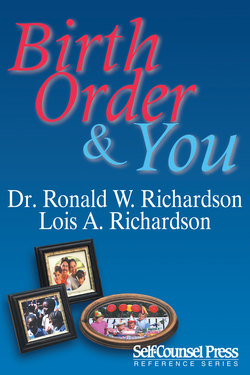Читать книгу Birth Order & You - Dr. Ronald W. Richardson & Lois A. Richardson - Страница 19
На сайте Литреса книга снята с продажи.
1. The effect of birth order — theirs and yours
ОглавлениеYour parents’ birth orders may partly explain why they treated you as they did. Birth order affects the kind of parent a person tends to be. People in the different birth order positions have different skills and shortcomings as parents.
Larry had always felt neglected by his parents and frustrated by the daily chaos in his home. Then he learned that his parents were both the babies in their families. When he realized what that usually means in terms of parenting skills — since a youngest rarely has any experience taking care of others — he was more understanding about their difficulty in nurturing or disciplining him, and more appreciative of the spontaneous fun he had with each of them. He also understood why they each always expected the other to take responsibility and neither of them would. Finding out that their apparent neglect had little to do with him as a person or his parents’ love for him helped Larry develop a much more rewarding relationship with them in their old age.
Birth order also explains why parents may treat each of their children differently. Their own birth order can affect what they think of — and therefore how they raise — each of their children. They may react to you the way they reacted to their own siblings in the same birth order position. They may be trying to avoid the past or to duplicate it.
Bernie was an oldest brother of a brother. He had spent most of his life taking care of and rescuing his brother who was an alcoholic. When Bernie had three children of his own (girl, boy, girl), his son replaced his brother as a focus of concern. The experience with his brother made Bernie anxious over the simplest problems his son encountered and prompted Bernie to play his familiar role of rescuing the younger male. The son reacted to dad’s rescuing behavior by taking less and less responsibility for himself. Eventually, he too became an alcoholic and died of an alcohol overdose at the age of 36. Bernie did not “make” his son into an alcoholic — another son in a similar situation might have reacted differently, but Bernie’s sibling experience had set him up for a repeat performance.
The way you relate to your parents can also be affected by a complementary or non-complementary birth order. If your birth order is complementary to one or both of your parents (you are in the same position as a sibling of theirs), you may have a more comfortable fit between you. For example, if you are the youngest brother of brothers and your father is the oldest brother of brothers, you may have a close, or at least easy, relationship with your father because you will have some of the same traits as his familiar younger brother. However, if you are the oldest sister of sisters, your oldest-brother-of-brothers father may find it more difficult to relate to you (and you to him), as both your sex and your birth position will be in conflict with him.
If your parent had a difficult time with his or her siblings, your complementary position could be a disadvantage for you. If you are the oldest sister of sisters and your mother was a youngest sister of sisters, she may not relate well to your serious side or your need for high achievement. If she perceives you as being domineering like her older sister was, she may empathize with your younger sister and take her side in any disputes.
Parents who have the same birth order as a child of theirs often understand that child better than the others, but may have more conflicts as they clash head-on in assuming that particular role in the family.
Ed was an oldest who worked hard at impressing his father with his accomplishments. Dad was an oldest, too, and was proud of his son, but found it difficult to spend much time with him. They often argued about the best way to do something. Dad was often disappointed in Ed’s younger brother Mickey, but spent more time playing ball with him than he had with Ed. Ed’s mother, a youngest, was less impressed with Ed’s accomplishments and wished he had a better social life, but she felt more comfortable with him than with Mickey.
Knowing how birth order affects personalities and relationships is helpful in understanding why your parents and their siblings and their own parents relate to each other in certain ways. For example, if you are the youngest sister of sisters, you may have a wonderful relationship with your oldest-sister-of-sisters grandmother and be bewildered at the enmity between her and your father who is an oldest brother of sisters. It could be that their non-complementary positions make it difficult for them to understand each other.
If your birth order is neither the same as nor complementary to either of your parent’s, you may feel somewhat isolated in your family. You could be a birth order “misfit” in their experience, which might make it difficult for your parents to know how to relate to you. For example, if you are the youngest brother of brothers and both your parents are the oldest siblings of sisters, neither has had a younger brother and neither knows what it’s like to be a youngest.
